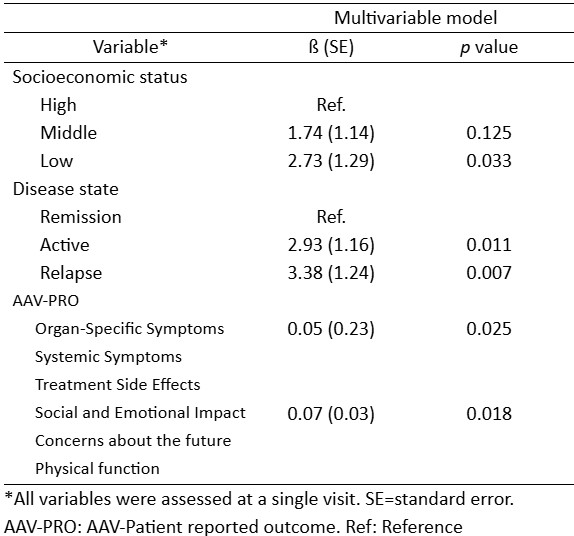Session Information
Session Type: Poster Session A
Session Time: 10:30AM-12:30PM
Background/Purpose: Depression and anxiety symptoms have been reported in 28% of patients suffering from vasculitides. However, in patients with ANCA-associated vasculitis (AAV), their frequency and their associated factors remain to be identified at global level. The aim of this study is to determine the factors associated with depression and anxiety in AAV patients from a Latin American cohort.
Methods: Patients from a single-center Peruvian AAV cohort [the Almenara Vasculitis cohort] were included. Depression symptoms were assessed by the Patient Health Questionnaire-9 (PHQ-9) questionnaire whereas anxiety symptoms were assessed by the Generalized Anxiety Disorder-7 (GAD-7) questionnaire. For both questionnaires, the higher the score, the greater the intensity of the corresponding symptoms: GAD-7 ranges from 0 to 21 while PHQ-9 ranges from 0 to 27. Potential associated factors were sex, age, ethnicity, educational level, relationship status, employment and socioeconomic status (SES), disease activity, erythrocyte sedimentation rate level, C-reactive protein level, ANCA status, glucocorticoid use and doses, immunosuppressive (IS) use and type, diagnosis and the AAV-Patient reported outcome (PRO) questionnaire domains. Cross-sectional univariable and multivariable linear regression models were performed. The multivariable models were done using a backward selection procedure with an alpha to stay in the model of 0.05.
Results: Eighty-eight patients were included; 49 (69%) were female and their mean age at diagnosis was 61.4 (13) years. The GAD-7 and the PHQ-9 scores at baseline were 6.3 (4.3) and 7.2 (4.9), respectively. In multivariable analysis, middle SES, active disease, and the social and emotional impact domain of the AAV-PRO were negatively associated with anxious symptoms. On the other hand, low SES, relapsing and active disease, and organ-specific symptoms and the social and emotional impact domains of the AAV-PRO were negatively associated with depressive symptoms.
Conclusion: A middle-low SES, relapsing and active disease, and some domains from the AAV-PRO (social and emotional impact, organ-specific symptoms) were associated with higher intensity of anxiety and depression symptoms. Further studies are needed to evaluate these findings in other populations and seek better strategies to improve depression and anxiety symptoms in AAV patients.
 Table 1: Factors associated with depression symptoms as assessed by the PHQ-9 questionnaire.
Table 1: Factors associated with depression symptoms as assessed by the PHQ-9 questionnaire.
.jpg) Table 2: Factors associated with anxiety symptoms as assessed by the GAD-7 questionnaire.
Table 2: Factors associated with anxiety symptoms as assessed by the GAD-7 questionnaire.
To cite this abstract in AMA style:
Oyarce-Calderón A, Figueroa-Sánchez A, León-Yaurimucha L, Gamboa-Cárdenas R, Rodríguez-Bellido Z, Perich-Campos R, Alarcón G, Ugarte-Gil M, Pimentel-Quiroz V. Factors Associated With Depression And Anxiety In ANCA-Associated Vasculitis Patients: Data From The Almenara Vasculitis Cohort [abstract]. Arthritis Rheumatol. 2025; 77 (suppl 9). https://acrabstracts.org/abstract/factors-associated-with-depression-and-anxiety-in-anca-associated-vasculitis-patients-data-from-the-almenara-vasculitis-cohort/. Accessed .« Back to ACR Convergence 2025
ACR Meeting Abstracts - https://acrabstracts.org/abstract/factors-associated-with-depression-and-anxiety-in-anca-associated-vasculitis-patients-data-from-the-almenara-vasculitis-cohort/
